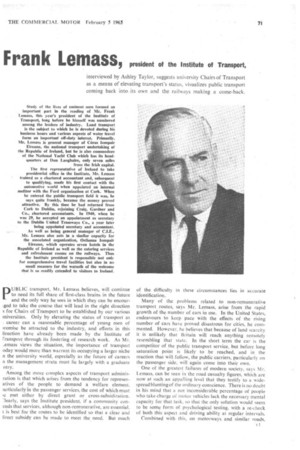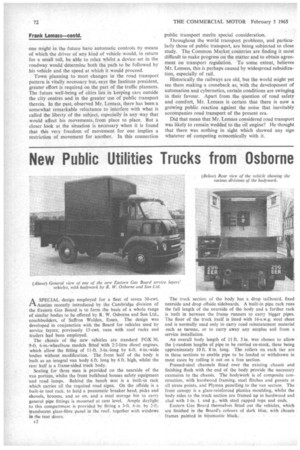F rank Lemass, president of the Institute of Transport,
Page 73

Page 74

If you've noticed an error in this article please click here to report it so we can fix it.
interviewed by Ashley Taylor, suggests university Chairs of Transport as a means of elevating transport's status, visualizes public transport coming back into its own and the railways making a come-back.
PUBLIC transport, Mr. Lemass believes, will continue to need its full share of first-class brains in the future and the only way he sees in which they can be encourged to take the course that will lead in the right direction s for Chairs of Transport to be established by our various miversities. Only by elevating the status of transport as . career can a reasonable percentage of young men of )romise be attracted to the industry, and efforts in this lirection have already been made by the Institute of fransport through its fostering of research work. As Mr. emass views the situation, the importance of transport oday would more than warrant its occupying a larger niche
n the university world, especially •as the future of careers n the management strata must lie largely with a graduate ntry.
Among the more complex aspects of transport adminisration is that which arises from the tendency for represenatives of the people to demand a welfare element, rarticularly in the passenger services, the cost of which must re rnet either by direct grant or cross-subsidization. 21early, says the Institute president, if a community conends that services, although non-remunerative, are essential,
t is best for the routes to be identified so that a clear and lirect subsidy can be made to meet the need. But much
of the difficulty in these circumstances lies in accurate identification.
Many of the problems related to non-remunerative transport routes, says Mr. Lemass, arise from the rapid growth of the number of ears in use. In the United States, endeavours to keep pace with the effects of the rising number of cars have proved disastrous for cities, he commented. However, he believes that because of land scarcity it is unlikely that Britain will reach anything remotely resembling that state. In the short term the car is the competitor of the public transport service, but before long saturation point is likely to be reached, and in the reaction that will follow, the public carriers, particularly on the passenger side, will again come into their own.
One of the greatest failures of modern society, says Mr. Lemass, can be seen in the road casualty figures, which are now at such an appalling level that they testify to a widespreadblunting of the ordinary conscience. There is no doubt in his mind that a not inconsiderable percentage of people who take charge of motor vehicles lack the necessary mental capacity for that task, so that the only solution would seem to be some form of psychological testing, with a re-check of both this aspect and driving ability at regular intervals.
Combined with this, on motorways and similar roads. one might in the future have automatic controls by means of which the driver of any kind of vehicle would, in return for a small toll, be able to relax whilst a device set in the roadway would determine both the path to be followed by his vehicle and the speed at which it would proceed.
Town planning to meet changes in the road transport pattern is vitally necessary but, says the Institute president, greater effort is required on the part of the traffic planners. The future well-being of cities lies in keeping cars outside the city centres and in the greater use of public transport therein. In the past, observed Mr. Lemass, there has been a somewhat remarkable reluctance to interfere with what is called the liberty of the subject, especially in any way that would affect his movements, from place to place. But a closer look at the situation is necessary when it is found that this very freedom of movement for one implies a restriction of movement for another. In this connection public transport merits special consideration.
Throughout the world transport problems, and particularly those of public transport, are being subjected to close study. The Common Market countries are finding it most difficult to make progress on the matter and to obtain agreement on transport regulation. To some extent, believes Mr. Lemass, this is perhaps caused by widespread subsidization, especially of rail.
Historically the railways are old, but the world might yet see them making a comeback as, with the development of automation and cybernetics, certain conditions are swinging in their favour. Apart from the question of road safety and comfort, Mr. Lemass is certain that there is now a growing public reaction against the noise that inevitably accompanies road transport of the present era.
Did that mean that Mr. Lemass considered road transport was likely to remain wedded to the off engine? He thought that there was nothing in sight which showed any sign whatever of competing economically with it.


















































































































































































